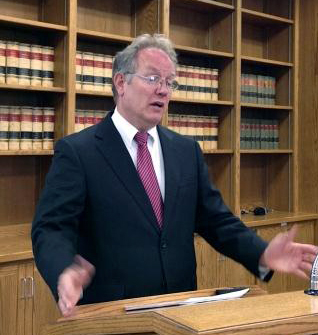Professor Kirkham Discusses Human Rights, the Constitution, and Religious Liberty

Professor David M. Kirkham addressed the topic “Human Rights, the Constitution, and Religious Liberty” as the second lecture in the International Center for Law and Religion Studies’ 2012 Religious Freedom Discussion Series, held 2 May 2012 at Brigham Young University.
Video recordings of the presentation: wmv mp4
Dr. Kirkham is Senior Fellow for Comparative Law and International Policy at the Center, and Regional Advisor for the European Union and Council of Europe. David Kirkham came to the Center in July 2007 from the George C. Marshall European Center for Security Studies in Garmisch-Partenkirchen, Germany, where he served as Associate Dean and Professor of International Politics and Democratic Studies in the College of International and Security Studies.
In this second chapter of the 2012 ICLRS Freedom of Religion Discussion Series, Professor Kirkham examined religious liberty and freedom of conscience while applying a compatibility test to the United States Constitution and international human rights documents. In light of both international and domestic legal norms, protections, and aspirations, this presentation marked the start of a quest for the harmonious intersections in these documents as well as for their potential pockets of discord.
In his lecture, Professor Kirkham addressed such questions as, Do international human rights transcend American constitutional values? Or should we laud the latter for their more than two hundred years of practical success and ignore the former as ill-defined, unenforceable abstractions, despite their claims to universality?
Given the reach of American influence and interests, these questions bear examination, be it in Southern Asia, Southern Europe or Southern Utah. Whether as simple as a Utah Legislature debate over Martin Luther King, Jr. commemorative license plates, or as serious as a Pakistani governor’s assassination for opposing a death sentence for blasphemy, questions of what constitute human beings’ most fundamental freedoms reverberate around the world.
Summary by Natalie Wright Romeri-Lewis
Professor David M. Kirkham’s presentation on “Human Rights, the Constitution, and Religious Liberty” instructed us on the various intellectual origins of the US Constitution. The Constitution’s “ideals and ideas” is the accumulation of the laws and philosophies of classical antiquity, English Common Law, the English Commonwealth, Enlightenment Rationalism, Puritan Covenant Theology, and other Christian thought. The framers were also influenced by their own state constitutions, geopolitical institutions, compromises, and other political-economic ideas. Of special interest is that at least five “state Constitutions required a test of faith before running for office.” Although the Constitution’s checks and balances reflect “a construction of Enlightenment counterpoints,” the resulting document also reflects the Puritan ideal that American would set an example for the world. Thus, because “religion was as pervasive in the 18th Century as in the 17th, religion did affect the Constitution.”
Professor Kirkham then contrasted the US Constitution with the Universal Declaration of Human Rights (“UDHR”). He explained that “the UDHR is not a constitution and is not binding, reads more like a Bill of Rights, but is more like a Declaration of Independence.” Although a few non-Western nations helped draft the UDHR, Professor Kirkham asked whether the UDHR “is a Western document emphasizing individual liberties or a declaration of civil [or innate (by virtue of one’s birth)] rights?” Kofi Annan stated that “no one list of rights is a blueprint for all countries.” In response, China asserts that “a nation’s political and economic history requires rights to be relative within each country.” This approach “concerns human rights activists that the UDHR will become meaningless if enough countries see it this way.”
Professor Kirkham encouraged attendees and those interested in religious freedom to join the debate: “We should embrace the UDHR and its language and dispute the evolution of rights when the discussion does not really include God-given rights. Don’t fear and stay out of the discussion. . . . We can embrace the language of the UDHR and be uncomfortable with some peoples’ interpretations of the language. If same-sex marriage is discussed as a human right, we need to join the debate and ask, ‘Where does it get its universality, as does heterosexual marriage?’ “